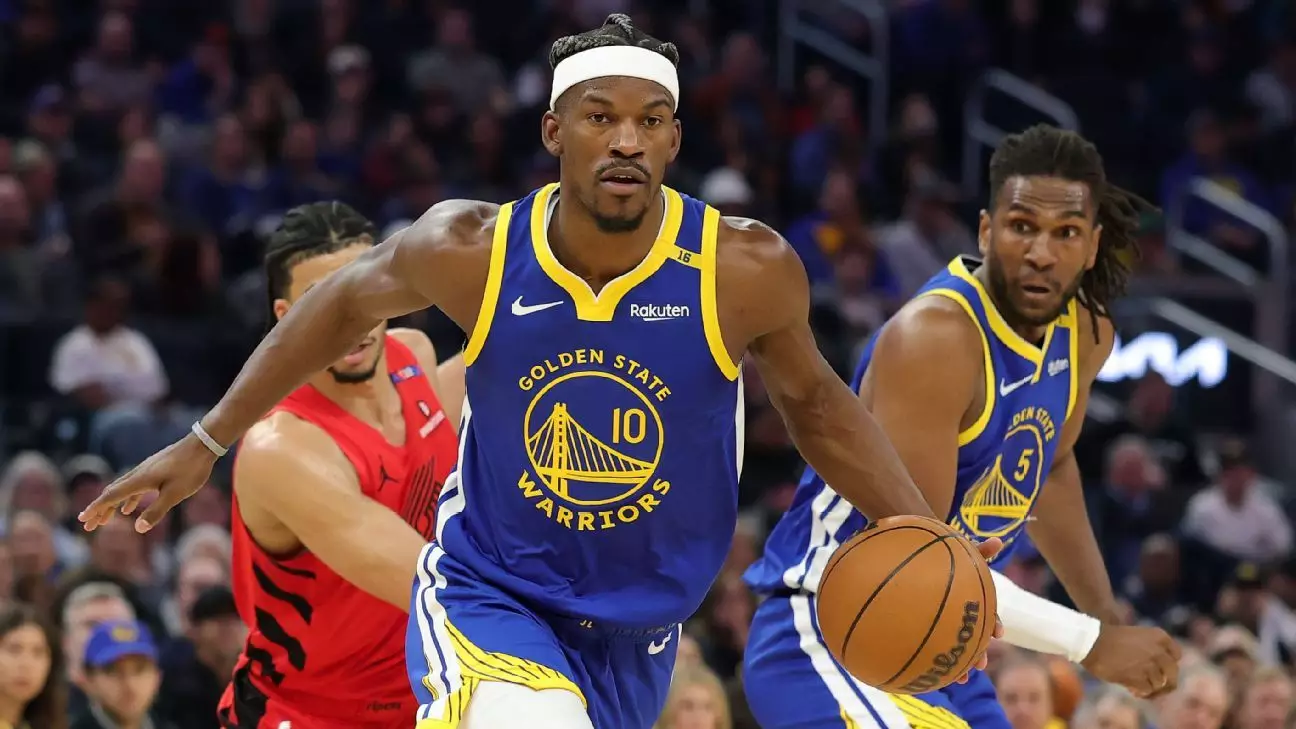The NBA is no stranger to melodrama, and Jimmy Butler’s recent career shift is a prime example of the league’s volatile nature. Butler’s return to Miami to face the Heat, the team that molded him into a household name, is anticipated to be a riveting spectacle on the court. However, Butler himself has downplayed the emotional intensity of this matchup, framing it as simply another game in a season filled with incredible highs and lows. This perspective provokes questions about how players emotionally navigate their past affiliations, especially when those exits are as tumultuous as his was with the Heat.
After being part of the Miami ecosystem where he experienced both the promise and challenges of playoff contention, Butler’s focus seems resolutely fixed on his current team, the Golden State Warriors. Following a disappointing loss to the Atlanta Hawks, in which the Warriors missed star player Stephen Curry due to injury, Butler’s candid remarks reveal a refreshing sense of responsibility. Instead of wallowing in nostalgia or regret about his past, he emphasizes the importance of the present and winning alongside his new teammates. This attitude encapsulates not only the mantra of the Warriors but also Butler’s deep competitive spirit.
Struggles of the Former Team
Miami, once a powerhouse in the Eastern Conference, finds itself mired in a ten-game losing streak, a startling turn of events since Butler’s trade. The statistics paint a bleak picture for the Heat, highlighting significant struggles that have drained their once vibrant energy. They have been outscored in the crucial fourth quarter—something that speaks volumes about their inconsistency and inability to close games. This alarming trend raises discussions about the team’s chemistry and adaptability in the face of adversity.
Butler openly acknowledges that his time in Miami didn’t culminate in championship glory, a sentiment that resonates given the multifaceted accountability players should bear. This acknowledgment also hints at the collective aspirations that sports teams harbor and the devastation of falling short. How Miami recovers from this decline will test the team’s resilience and the leadership of their current roster, which now includes Andrew Wiggins—a player who, like Butler, must now face the challenges of competing against the team that once valued him.
The Warrior’s Resolve: Butler’s New Support System
Moving to the Golden State Warriors represents a significant shift not only for Butler but also for a franchise grappling with injury setbacks. With Curry on the sidelines, the Warriors face an uphill battle in maintaining their competitive edge. Butler’s insistence on focusing on victory underscores the ethos of Golden State, a squad known for its incredible ability to adapt under pressure and perform at high levels regardless of circumstances.
The camaraderie among teammates, as articulated through Draymond Green’s comments, indicates a mutual understanding of the stakes involved. The dynamic of wanting to win not only for themselves but also for Butler—who carries the emotional weight of his past with Miami—illustrates the intricate bonds that define successful teams. This is further amplified by the added pressure on Wiggins as he confronts his past affiliation with the Heat.
Emotional Resilience on Display
As Butler prepares for this pivotal game in Miami, characterized as “just another game,” the multi-layered complexities of returning to a former team offer a lens through which we can view athlete psychology. Butler’s matter-of-fact attitude regarding his return, distancing himself from emotional entanglements, challenges the traditional narrative surrounding player rivalries and historic affiliations.
His reflections prompt a broader discussion: How should athletes manage the emotional rollercoaster of former loyalties while striving for success in a new environment? By maintaining an outward focus on winning, Butler sets a precedent that personal history does not dictate future performance, a philosophy that might inspire not only his teammates but also future generations of players navigating similar circumstances.
This intersection of personal ambition and team success is what makes the NBA endlessly fascinating and serves as a reminder that sports, despite their drama, often boil down to performance under pressure and the relentless pursuit of excellence—something Butler exemplifies in every game he plays.


Leave a Reply